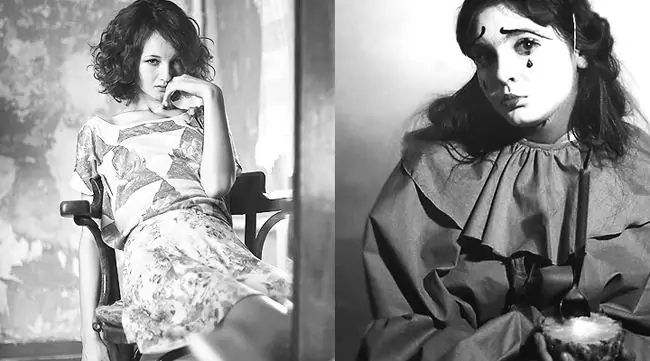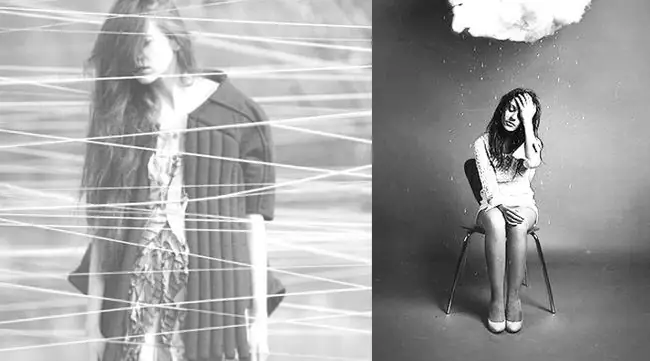- Author Adrian Jeff jeff@psychologosportal.com.
- Public 2023-12-17 05:06.
- Last modified 2025-01-24 14:09.
A healthy mind is not always in a healthy body
- - Doctor, I'm dying! - She turned pale, rolled her eyes, her outstretched hand fell on the hospital blanket.
- What happened? The doctor felt the pulse on his wrist. - Everything is normal, what is the pressure?
The frightened nurse measured the third time - normal values.
- Doctor, I'm dying! - She turned pale, rolled her eyes, her outstretched hand fell on the hospital blanket.
- What happened? The doctor felt the pulse on his wrist. - Everything is normal, what is the pressure?
The frightened nurse measured the third time - normal values.
The patient opened her eyes.
- I know I have a heart attack, heart … and I am still so young!
- Do not rush to conclusions, there are no violations on the cardiogram, now they should bring tests. How are you feeling?
- At death's door. I am losing my last hope. I knew, I knew it would end this way!
The out of breath nurse handed the doctor fresh tests.
- Calm down, please. Well, I told you, everything is all right. With such analyzes, you can even go into space. There is no heart attack, you have a healthy heart.
- How? Can't it be? - "dying" jumped up and looked around everyone with an angry glance. - Charlatan! I demand another doctor!
Disease seeking disease
Hypochondria, more precisely, hypochondriacal disorder, is a state of heightened concern about one's own health.

Attention to the slightest signals from the body is so sharpened that any changes are instantly recorded and regarded as manifestations of the disease. The person is absolutely convinced that he suffers from a serious illness that is subject to serious treatment, even surgery.
Negative results of diagnostic tests or procedures do not dissuade the patient, and he continues to be examined and consulted with new and new specialists.
Hypochondria refers to psychosomatic disorders, that is, the root of the problem is in the psyche, and its manifestations can take on a somatic character - it can be fluctuations in blood pressure, heart rhythm disturbances, gastrointestinal tract functioning, neurological symptoms.
This is due to the fact that the work of many organs is regulated by the autonomic nervous system, which can be directly influenced by the emotional state of a person, that is, emotions can change the work of internal organs. The intensity of the impact on the autonomic nervous system depends on the strength with which a person experiences any emotion.
The mental roots of hypochondria
The causes of hypochondria lie deep in the mental of a person and directly depend on the level of development of mental properties and the degree of their realization.
Only representatives of a particular vector set are prone to hypochondriacal disorders - these are the owners of the skin and visual vectors in an undeveloped state or under stress.
Accustomed to rationally calculating everything that happens, people with a skin vector are extremely scrupulous about their health. Rationally. They know how many calories per day are needed for "normal functioning of the body", which foods are the most useful. It is extremely important for them to be No. 1 in everything, to keep themselves in shape, to look corresponding to their status, emphasizing their superiority. They are the largest consumers of a variety of vitamins, dietary supplements and miracles.
If the skin vector is not implemented or suddenly finds himself in a stressful situation (for example, the salary has been lowered), then the skin person begins to hypertrophically monitor his health, twitch and fidget.
Its peculiarities arise when a visual vector is added to this set of properties. Representatives of the visual vector are the most sensitive and emotional people, they experience any emotions at their peak. In an undeveloped state or under stress, fear becomes their main emotion. The imaginative thinking and rich imagination of a person with a visual vector transfer into real life the most bizarre images of even invented and completely groundless fears.

The fear of death is the strongest and most ancient fear of the visual vector, which, combined with the skin's desire to be healthy, gives the strongest concern for the state of one's health.
All thoughts of such a person are preoccupied with themselves, all attention is focused on any manifestations of the body's vital activity: the pulse and respiration rate is constantly recorded, blood pressure, body temperature and other indicators of the normal functioning of the body are measured. The slightest changes, even within the normal range, are regarded as manifestations of the disease. Often such people turn to the Internet for information, looking for a rare, exotic, and even better an incurable (for greater drama) disease.
Any doctor who, with the help of logical arguments supported by the results of numerous examinations, tries to dissuade such a patient that he is seriously ill, will be accused of incompetence and inattention to patients, his arguments will not be taken into account, and visits to doctors will continue.
But in order for such a “patient” to start working the scenario “a healthy mind in a healthy body”, it is first necessary to cure the very spirit - the human psyche, in which the roots of the problem are located.

The real reason for this behavior is not a search for a non-existent disease, but the opportunity to kind of shine on the stage, get a few minutes of attention, interest and arouse sympathy, create, albeit temporary, but lively emotional connection with the doctor, nurses, other patients and thus fill the lack of an undeveloped visual vector - to get for yourself a little attention, sympathy, somewhere even love.
A person with a visual vector in a developed state realizes himself in giving the same feelings to others, sincerely sympathizing, helping, empathizing with people who need it, and gets much more complete pleasure from this than a scant relief of tension when receiving these feelings for himself.
What to do?
Most of all, such people demand attention and complicity from others (relatives, friends, medical staff), throwing out their far-fetched suffering, fictitious or sucked out of the finger complaints and symptoms.
However, it should be remembered that the more we indulge the hypochondriac, the less he wants to seek realization in a different way. Our attitude towards him, of course, should be sympathetic, but with very dosed empathy.
The best way to communicate with hypochondriacs is a benevolent, but restrained attitude with a parallel switch to activities related to the emotional sphere, in which he could fill the lack of the visual vector.
This can be helping a sick relative, neighbor, friend, working with children or the elderly, any activity aimed at empathy, sympathy for another person who needs it. You can also interest him in public activities such as a theater group, an acting studio, singing, choreography, etc.
Having received an outlet for their emotions and the opportunity to create an emotional connection with the audience during performances or with a person in need of help, the hypochondriac, without knowing why, gradually loses interest in his imaginary illness, as he finds a more effective way to fill his shortages.
At the root of hypochondria lies the most ancient and native fear of death for the visual vector. And then any manifestations are fear FOR YOURSELF, directed inward. When a person learns to endure his fear OUTSIDE, that is, to worry about others, to perform actions based on empathy and complicity, fear as a destructive feeling leaves, giving way to the most creative feeling, whose name is Love.

Fear, as a kind of primitive sensation, is not able to fill the lack of the visual vector of a modern person. That is why the visitor in an undeveloped state is forced to constantly look for new portions of this scanty satisfaction of his needs, while the same feeling, but directed not at himself, but at others, gives the filling of such strength that any unhealthy search for someone else's attention to his person disappear as unnecessary.
A person, perhaps for the first time in his life, will feel the fullness of life, experiencing love for his neighbor at the same emotional peak characteristic of himself, only filling in this case to the maximum.
A deep understanding of the psychological motives of a hypochondriac's behavior makes it possible to take a different look at this problem, the solution of which lies not in another unnecessary examination or medical procedure, but in the realization of the innate psychological properties of a particular person.
Hypochondria is not a disease and not even a search for it, it is a pathological condition of congenital vectors, when, due to insufficient development in childhood, it is impossible to find a full-fledged way of realization for oneself in adult life.






